Some posts on this site contain affiliate links. If you book or buy something through these links, I earn a small commission (at no extra cost to you). Take a look at my privacy policy for more information.
Fragrant smoke rolls over me. Conrad Little Leaf, my guide at the Head Smashed in Buffalo Jump Interpretive Center, fills the room with a prayer, speaking first in the melodic language of the Blackfoot people, then switching to English for my benefit.
He prays for a long time, praying for everything and everyone imaginable. For me – his guest on this intriguing tour of the Blackfoot culture – and for the other visitors to the Center. He prays for the planet, for the vulnerable. He prays that the rich will think more about what they’re doing to the earth, and that we’d all look after the world more. That we will have time to save the planet.
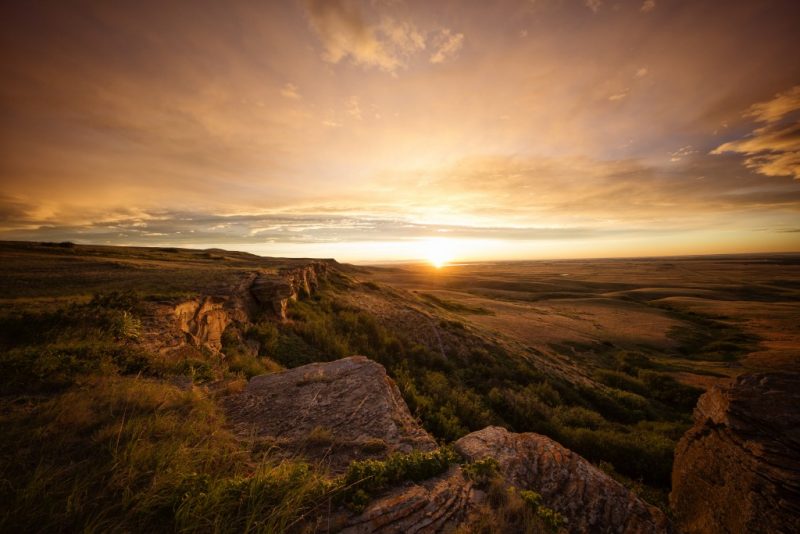
“Lately,” Little Leaf says, “there’s been a lot of change happening in a short space of time. I pray that we will have time to stop and make the right changes to protect the planet”.
I’m not a religious person, but Little Leaf’s prayer feels more like a message to humankind than a plea to any deity. This week in Alberta, as I’ve learnt about his people – about their traditions and their relationship to nature – I’ve begun to wonder if we need to re-discover this sense of respect for the earth.
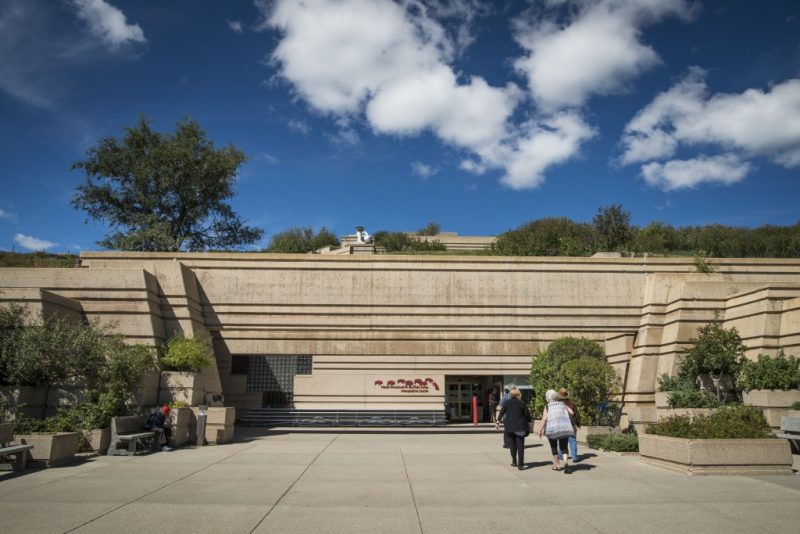
Head Smashed in Buffalo Jump Interpretive Center
It was not the most conventional start to a museum tour, but this is not the most conventional museum. The Head Smashed In Buffalo Jump Interpretive Center gazes out across Alberta’s prairies, built into the edge of a cliff which once served as a Buffalo Jump for the Blackfoot people.
Before we began, we burned sage leaves and sweetgrass. Little Leaf showed me how to wash the scented smoke over myself, head to toe, four times. Four is a significant number for the Blackoot, he tells me, because it’s the number of elements.
Then, we talk. We may be sitting in a simple classroom inside the Center, but Little Leaf takes me on a meandering journey through the history and traditions of the Blackfoot. From the buffalo jumps of thousands of years past, to the more recent years – including his own childhood on a reservation in Alberta. He talks for what feels like hours, sharing stories, giving me tantalising glimpses of a rich heritage. I’m so engrossed that I forget I’m a blogger, forget to film anything or take photos. It feels too intrusive, anyway – so instead I just listen in wide-eyed fascination.
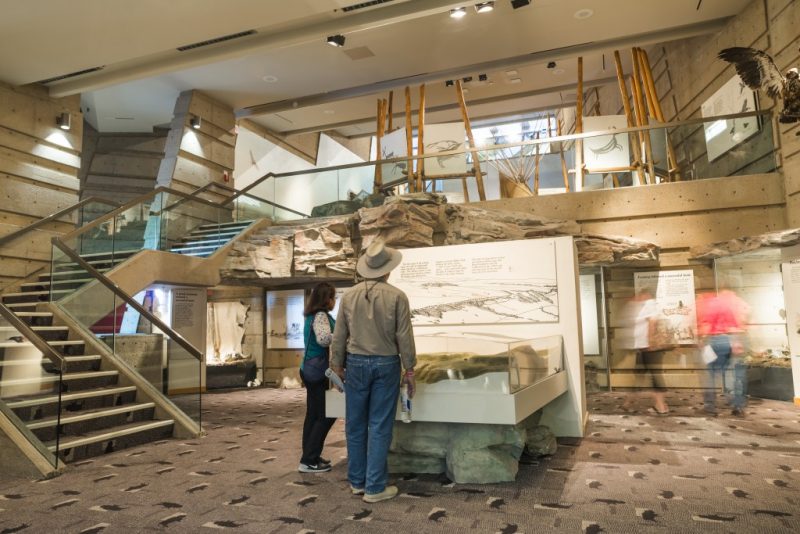
What is a Buffalo Jump?
About once a year, in autumn time, the Blackfoot people would prepare for a great Buffalo Jump. Simply put, this was a mass-killing of buffalo in preparation for the approaching winter.
Imagine a crisp Autumn day on the prairies. A herd of between 100-300 buffalo are grazing quietly, wildflowers are waving in the breeze. And after days of preparation, the Blackfoot hunters are ready for the kill.
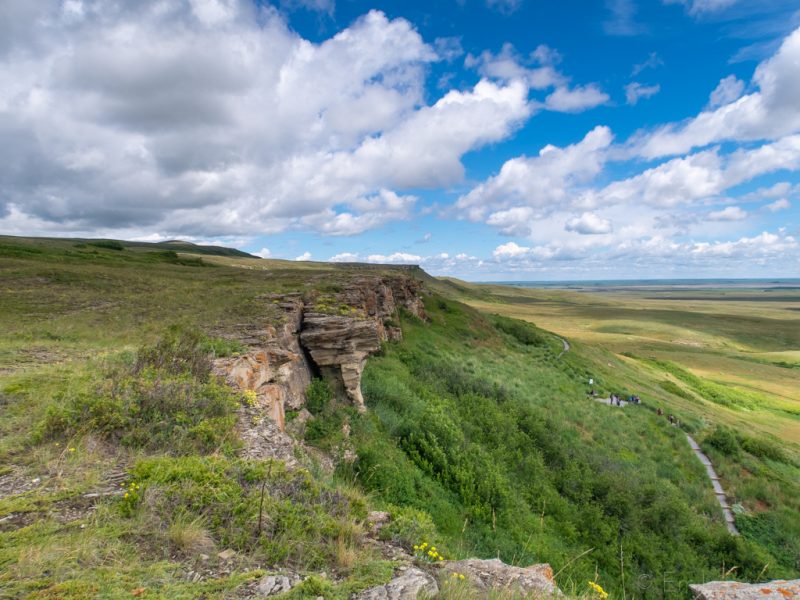
Hunters would dress in wolf pelts to approach, creating a sense of threat. A Buffalo Runner would entice the herd to follow him by imitating the bleating of a lost calf. The herd’s instinct is to get between a calf and a wolf, so the runners would use that instinct against them to begin a stampede.
Rows of rock piles had been laid out in advance, creating drive lines leading to the jump. As the herd began moving, hunters would leap out from behind the rock piles, shouting, waving pelts, and shooting arrows to rile up the buffalo into a stampede.
The ground shook with the sound of hundreds of hooves, as the herd thundered towards the edge of the cliff. The lands for the Jumps were chosen carefully; these were edges that didn’t become obvious until too late. One by one, the buffalo plummeted over the cliff, forced over the edge by the sheer weight of the herd behind
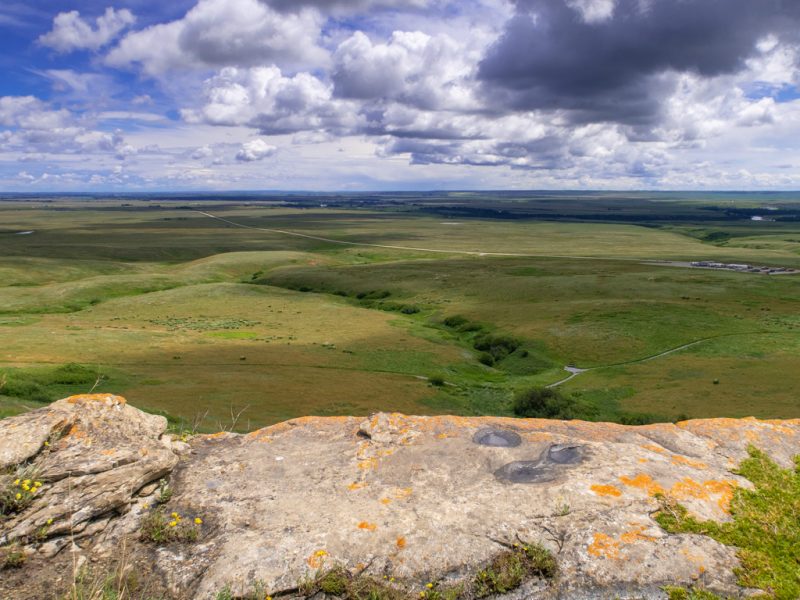
All the Good That’s Inside
According to Little Leaf, the true Peigan name for this area is not Head-Smashed-In but Piskát. He translates this to mean “all the good that’s inside”. This seems particularly poignant, because the Blackfoot used every part of the buffalo. Right down to the intestine. “Squeeze out the waste and barbecue it,” Little Leaf says, “because that’s the part with all the good inside”.
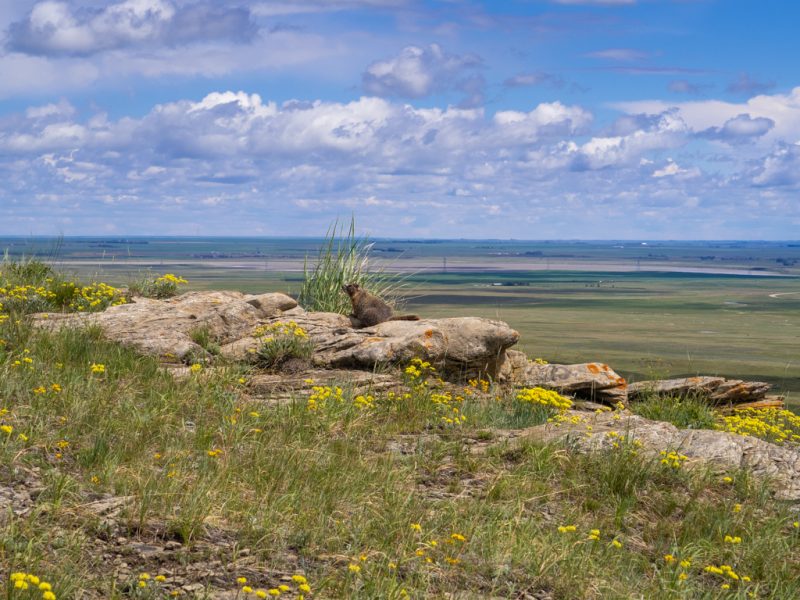
After the Jump, the Blackfoot would harvest everything: the pelts, the meat, bones, bone marrow, all the guts. Nothing was wasted. They would roast or dry the meat for food, use the furs for clothing, use bone for tools. A Buffalo Jump would be enough to feed and clothe the tribe for the whole winter.
Anything they didn’t finish would be left behind to feed other animals and insects, and to nourish the land. The belief was that the creator made the grass, made the buffalo to eat the grass, and made humans to eat the buffalo, creating a circle of life within which we are all dependent on one another.
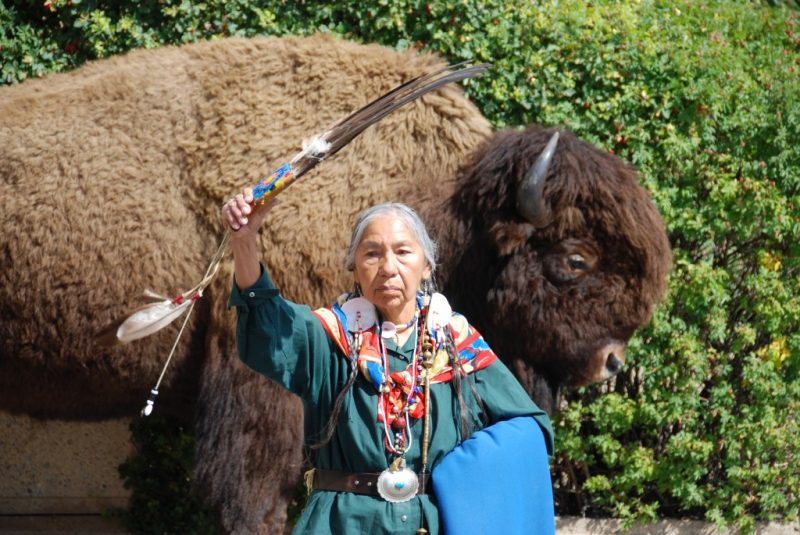
Although Little Leaf gives the area a different name, Head-Smashed-In comes from a Blackfoot oral tradition. According to legend, a young boy stood beneath the shelter of a ledge to watch the hunt. As the bodies mounted up be was stuck between the buffalo and the cliff, and was later found dead with his skull crushed by the weight of the animals.
Things to do at Head Smashed in Buffalo Jump
Explore the Interpretive Center – It takes about 1.5 hours for a self-guided tour of the Center. You’ll learn about all aspects of the Buffalo Jump, as well as Blackfoot life in general. From the ecology of the Northwestern Plains, to the lifestyle and rich culture of the early Plains Peoples. You’ll also discover how the arrival of Europeans ended the days of traditional buffalo hunting, and almost brought the species to extinction.
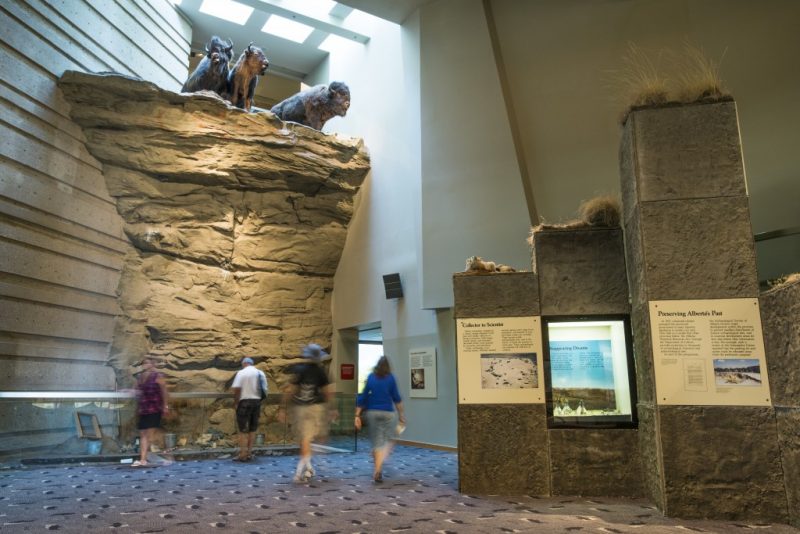
Book a Tour – The Interpretive Center employs Blackfoot guides, so you have a chance to speak to them about their traditions and customs. Little Leaf was an incredible individual, and one of the most fascinating tour guides I’ve ever had. As someone who didn’t know much about North America’s indigenous peoples, it was a brilliant opportunity to learn more from natives who have grown up with the traditions of their people.
Taste Buffalo – In the Center’s cafeteria, you’ll find a fab menu inspired by Blackfoot recipes. Including several buffalo dishes. The days of the Jump may be over, but buffalo farming is re-emerging in Canada and this is a nutritious alternative to beef. Less fat and more protein! It’s also pretty tasty – I had buffalo chilli and it was great!

Walk the Interpretive Trails – Two self-guided interpretive trails offer the chance to get a closer view of the kill sites and other archaeological finds from the area. The Cliff Top Trail offers a stunning view of the plains, taking you up to the edge of the very cliff that buffalo stampedes once crashed over. The longer Lower Trail leads around the grasslands, passing by the archaeological excavation sites at the base of the cliffs.
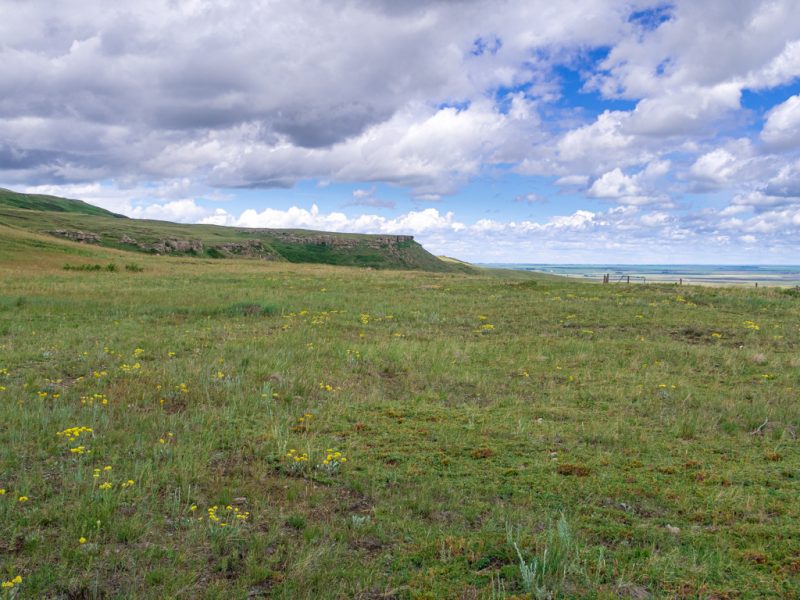
More Information
Head Smashed In Buffalo Jump is 18km northwest of Fort Macleod and two hours south of Calgary. The Center has free parking, a cafeteria, theatre, and a gift shop. Tickets prices start from $15 CAD for one adult.
If you want more information, you can check out my other blog posts about Alberta here…
Alberta Road Trip – Fossils, First Nations, and Frontiers
Adventures on the Icefields Parkway
Amazing Places to Visit in Alberta to Get off the Beaten Path
My trip was supported by Travel Alberta and Explore Canada and my visit to the Center was complimentary. But, as ever, all words and opinions are completely my own.
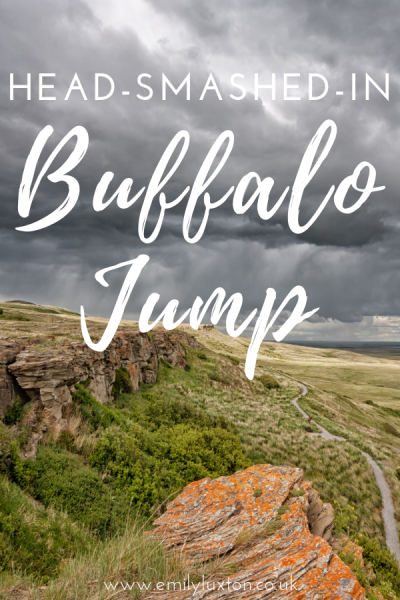




Love that you were so captured by this experience and it made you stop and think for a moment.
Thanks Nim! It was such an amazing final stop – felt like it really tied the whole trip together!
wow… very different. really interesting place! Thanks for posting!
It was so interesting! And it really did just make me stop and reflect for a while. I had to tear myself away to head to the airport!
Wow! Never heard of this tradition. Love the yellow flowers there. :) I’m sure you had great fun.
Thanks Renuka! It was such an interesting place – like you I’d never heard of that tradition. Even when I was there, it was hard to imagine the scale of something like that!!